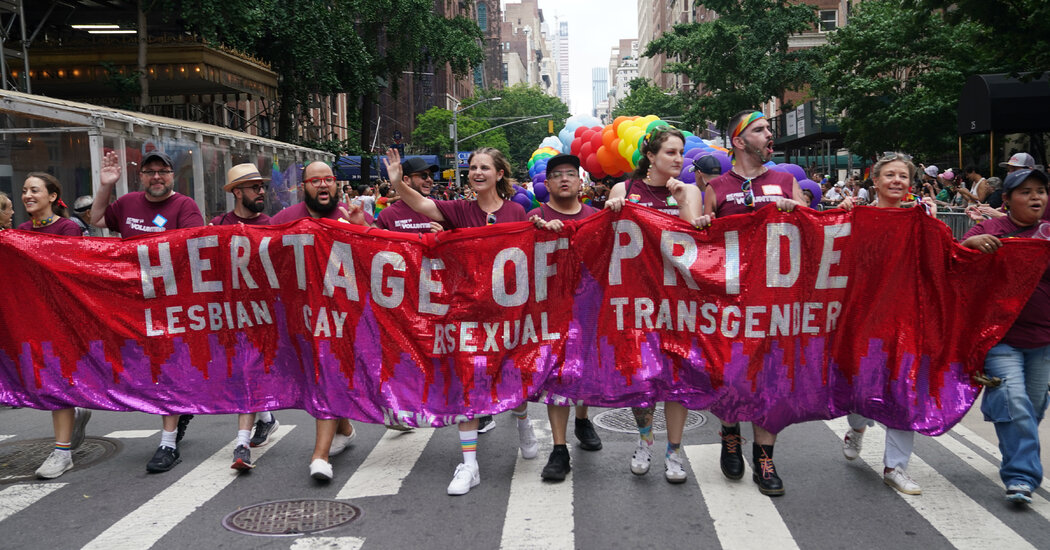Roughly one quarter of the corporate donors to New York City’s annual Pride festivities have either canceled or scaled back their support this year, citing economic uncertainty and fear that the Trump administration could punish corporations it viewed as supporting a celebration of gay and transgender rights.
Almost all the biggest donors to last year’s celebration have pulled back, and the retreat has been seen at all levels of sponsorship, according to a spokesman for Heritage of Pride, which produces the events. That has posed a fresh challenge to the organization, which has operated at a significant financial loss since before the pandemic.
The spokesman, Kevin Kilbride, said the funding shortfall may force the organization to downsize or cancel some of its June events or other initiatives it runs throughout the year, such as a community grant program that distributes money to smaller L.G.B.T.Q. organizations in New York.
“The vast majority of what we have heard is that folks are treading carefully from an economic perspective,” said Mr. Kilbride.
Corporate representatives have been more guarded when discussing the political environment, he said, “but some folks have definitely mentioned the fear of potential blowback from the Trump administration if you are a big corporation and you are publicly supporting D.E.I. initiatives.”
The retreat of corporate sponsors, including Mastercard, Nissan and Garnier, follows years of wavering support from companies for L.G.B.T.Q. causes. It has left Heritage of Pride facing an unexpected shortfall of an estimated $350,000, a difficult blow for an organization whose spending has significantly outstripped its income every year since 2019, when it hosted WorldPride, a much larger global gathering.
According to publicly available tax data, Heritage of Pride operated at a loss of more than $2.7 million in 2022 and $1.2 million in 2023, on a budget of roughly $5.5 million. Those challenges have forced the organization to reduce the scope of NYC Pride in recent years. In a statement it said its long-term goal is “to bolster individual giving to diversify our funding streams and reduce reliance on corporate partnerships.”
New York City Pride is held each June in commemoration of the 1969 Stonewall Riots, which are popularly seen as a catalyst for the modern gay rights movement. It includes a week of events capped off by a rally and a march that organizers say typically draw around 25,000 marchers and two million spectators to Manhattan.
The troubles Heritage of Pride is confronting this year mirror those faced by Pride celebrations in other parts of the country, where a drop in corporate sponsorships has imperiled the funds that help pay for security, insurance and other needs. Similar financial pain has struck L.G.B.T.Q. social service organizations in New York and nationwide, which rely on donors and public funds.
The Lesbian, Gay, Bisexual & Transgender Community Center in Manhattan has seen a 20 to 30 percent reduction in revenue from corporate partners this year, said Renee Colombo, its chief development officer. And some corporate partners who do donate have begun “asking for anonymity for the time being,” she said.
Ms. Colombo said she thought many companies were concerned because they “consider themselves to be federal contractors” and fear running afoul of the Trump administration’s crackdown on diversity, equity and inclusion policies, which has included directives aimed at contractors and the private sector.
“There’s just so much confusion right now about what’s permissible and what’s going to really harm business,” said Ms. Colombo.
For New York City Pride, the financial shortfall could mean “fewer floats or fewer vendors” in June, Mr. Kilbride said. But the deeper threat could be to other activities organized by Heritage of Pride, including its program of community grants, which gave more than $100,000 to smaller organizations in 2023, the most recent year for which data is available.
There are a range of funding options for companies looking to sponsor New York City Pride events. The highest tier of sponsorship, Platinum, costs $175,000, and the lowest tier costs $60,000. Companies can also sponsor a specific event for as little as $7,500, according to Heritage of Pride.
Four of the five companies that were Platinum sponsors last year — Garnier, Skyy Vodka, Target and Mastercard — have either scaled back, backed out or asked for their involvement to go unpublicized, said Mr. Kilbride.
The only company to return as a Platinum sponsor is L’Oreal, which is donating through an L.G.B.T.Q. employee group. A second company, Deutsche Bank, is joining the Platinum tier this year after sponsoring at a lower level in the past, Mr. Kilbride said.
Other companies that previously donated at lower levels and have canceled or scaled back their support this year include PepsiCo, Nissan, PricewaterhouseCoopers and Citi, according to corporate spokesmen and Heritage of Pride. Some of the companies’ decisions were first reported by The Wall Street Journal.
Several of them attributed the change to an uncertain economic outlook. In a statement, a spokeswoman for Nissan said the automaker was “currently reviewing all marketing and sales spending, including auto shows, sports properties and other entertainment activations, to maximize both efficiency and breakthrough effectiveness.”
Though Target is again donating to Pride this year, it is doing so as a “silent partner” and foregoing “the publicity” of being named a Platinum sponsor, according to Mr. Kilbride.
Joe Unger, a spokesman for Target, said the company “is sponsoring NYC Pride at a level consistent with last year” and declined to answer further questions. Target is not currently listed as a sponsor on Pride’s website.
The company had faced a backlash from conservatives for its in-store Pride Month displays. But in recent months, it has drawn the ire of liberals by announcing it would end its diversity commitments and policies, including those involving L.G.B.T.Q. issues.
Fabrice Houdart, the executive director of the Association of LGBTQ+ Corporate Directors, said he was skeptical of corporations that said they were pulling back support for Pride celebrations for economic reasons, in part because it costs relatively little to sponsor the events.
“I find it very difficult to believe this is about the economic context,” he said. “One thing that is striking about the conversations I have had over the past few months is there are a lot of companies saying ‘I won’t engage on anything L.G.B.T.-related because I don’t want to find myself being a target.’”
Corporations have become increasingly nervous in recent years as backlash has grown to gains made by the L.G.B.T.Q. community, and especially by transgender people, said Matt Skallerud, the president of Pink Media, which specializes in L.G.B.T.Q. marketing.
“These decisions to pull back have been underway for almost two years now,” he said.
A turning point for many was the conservative boycott of Anheuser-Busch, the makers of Bud Light, after the transgender influencer Dylan Mulvaney promoted the beer on Instagram in 2023.
Her post sparked a conservative uproar, and the company’s subsequent handling of the crisis later angered liberals, who said it did too much to appease conservatives and not enough to support Ms. Mulvaney.
In the six weeks after her post, sales of Bud Light fell by almost 25 percent, and the stock price of Anheuser-Busch fell by almost 20 percent.
“A lot of bigger companies are taking a back seat because they are afraid to be boycotted from either the left or the right,” said Mr. Skallerud.
Liam Stack is a Times reporter who covers the culture and politics of the New York City region.
The post Nervous Corporate Sponsors Retreat from New York Pride appeared first on New York Times.




